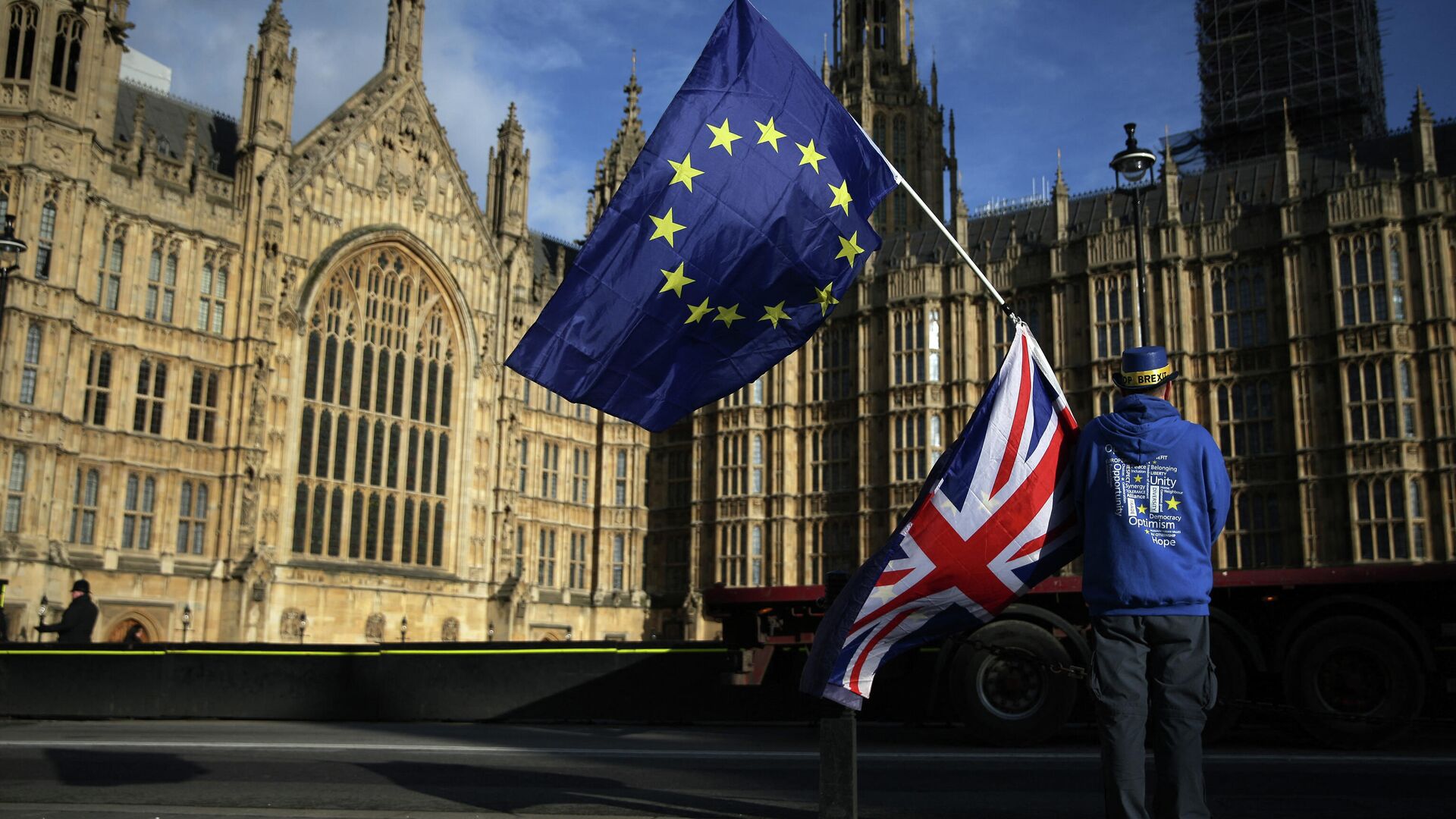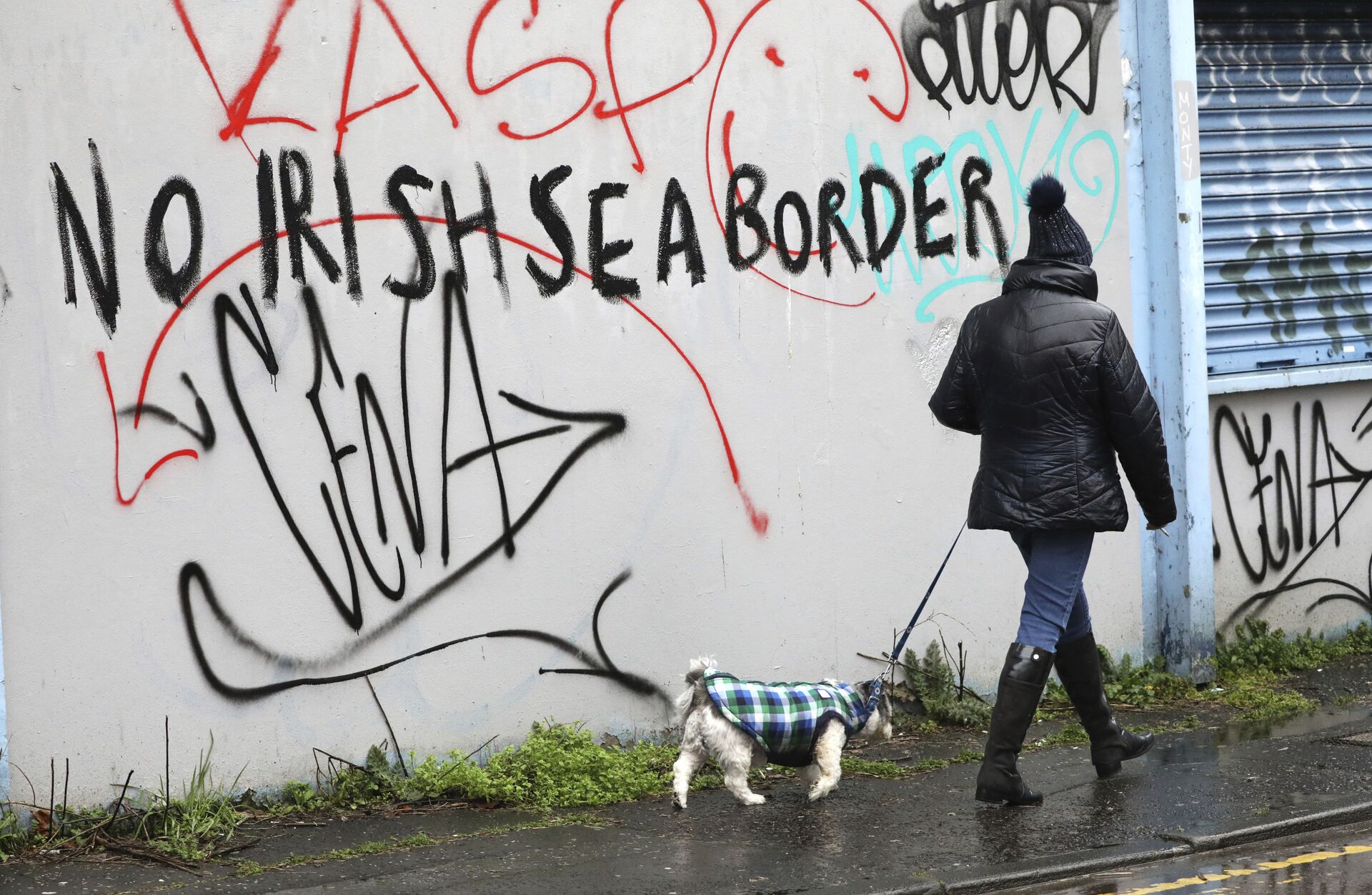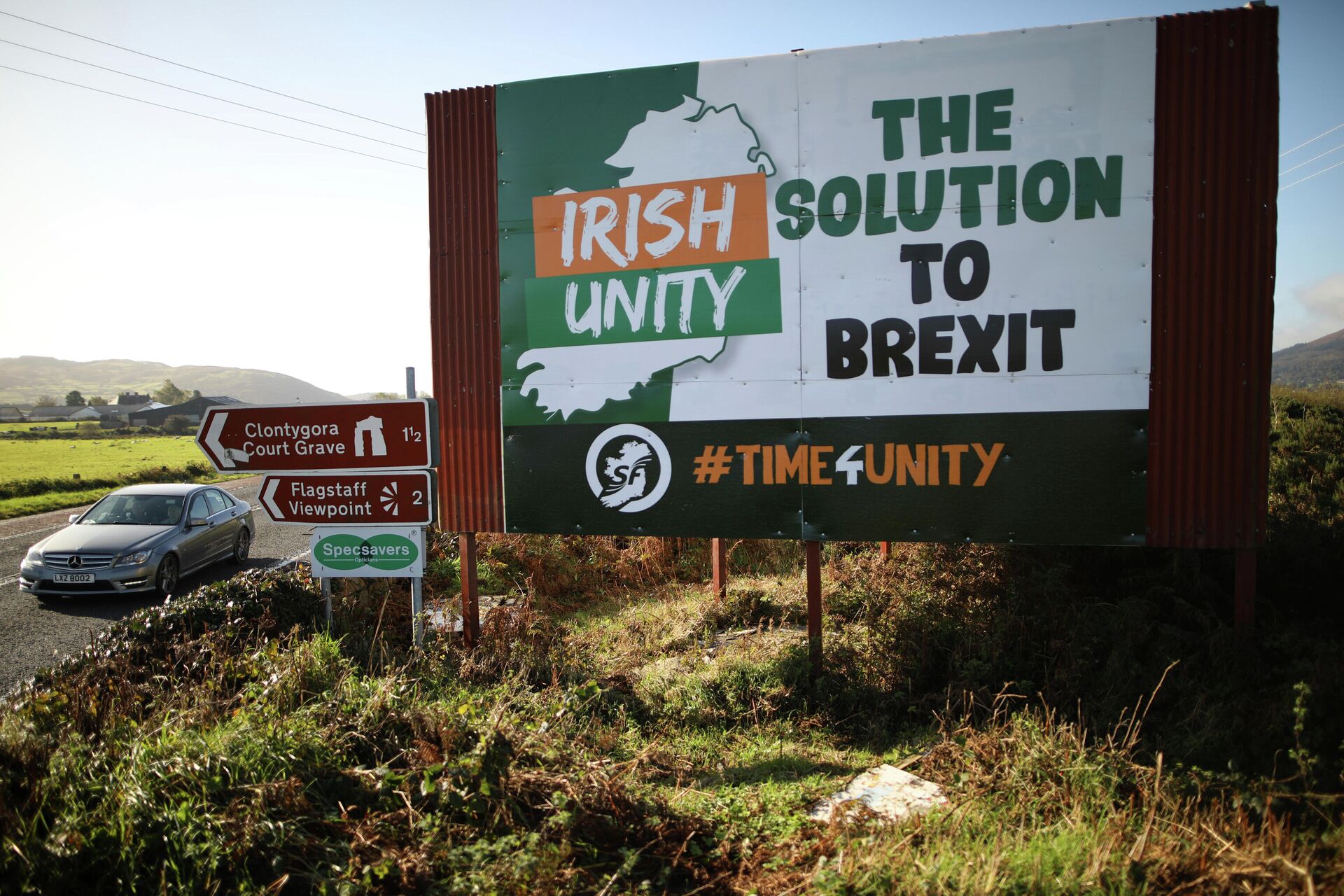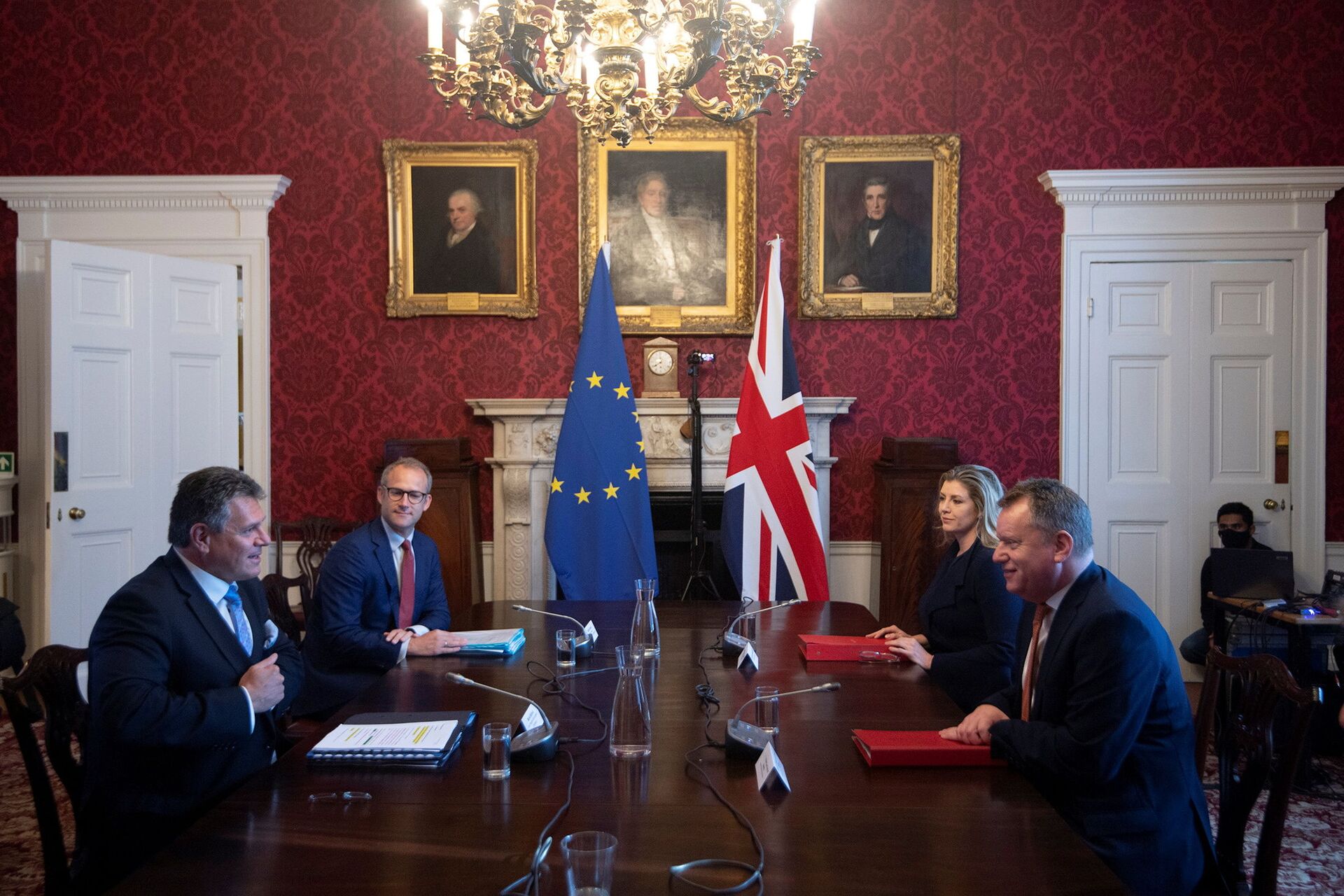https://sputnikglobe.com/20211015/eu-reportedly-threatens-robust-response-such-as-blocking-uk-energy-supplies-amid-ni-protocol-row-1089951538.html
EU Reportedly Threatens ‘Robust Response’ Such as Blocking UK Energy Supplies Amid NI Protocol Row
EU Reportedly Threatens ‘Robust Response’ Such as Blocking UK Energy Supplies Amid NI Protocol Row
Sputnik International
UK Brexit Minister David Frost has claimed that EU proposals offering "a type of express lane” to ease movement of goods across the Irish Sea aren't enough. In... 15.10.2021, Sputnik International
2021-10-15T14:22+0000
2021-10-15T14:22+0000
2023-05-28T15:35+0000
european court of justice
newsfeed
europe
maros sefcovic
european union (eu)
post-brexit
david frost
united kingdom (uk)
brexit
https://cdn1.img.sputnikglobe.com/img/07e5/0a/09/1089785347_0:161:3066:1886_1920x0_80_0_0_6d847d84929d9e566a66b0caf4c047fc.jpg
As UK Brexit minister David Frost arrived in Brussels today for a showdown with his EU counterpart Maros Sefcovic, the 27-member bloc is preparing to retaliate by blocking cross-Channel energy supplies if London rejects the proposed deal on the Northern Ireland protocol, according to the Financial Times.Representatives from five member states, led by France, Germany, and the Netherlands, with Italy and Spain in tow, are said to have demanded a “legally sound, proportionate and robust response” be prepared if Britain follows through on its earlier threat to trigger the Article 16 safeguard measure, incorporated in the Protocol on Ireland/Northern Ireland Brexit Withdrawal.They are reported to have met with Sefcovic to demand he ready a contingency plan for a possible trade war, according to diplomats cited by the outlet. The measures floated purportedly include curbing the UK's access to energy supplies, imposing tariffs, or, as an extreme measure, terminating the trade agreement. While the majority of the UK’s domestic natural gas has come from the North Sea and Irish Sea since the early 1960s, the same proportion (close to 40 percent) is from European imports via pipelines. This comes as the UK cabinet minister meets with European Commission Vice-President Maros Sefcovic to seek a breakthrough on the contentious issue of the Northern Ireland Protocol. As a result of Brexit negotiations, an effective Irish Sea border was created to avoid a hard border on the island of Ireland and protect the Northern Ireland peace deal (the Good Friday agreement). This ensured that the land border between the Republic of Ireland (still part of the EU) and Northern Ireland (in the UK) remain open. The Protocol on Ireland/Northern Ireland in the Brexit Withdrawal agreement stipulates that Northern Ireland remains part of the UK's customs territory but has to adhere to certain EU rules to allow goods to move freely into the republic and the rest of the EU. One of the architects of the divorce deal, David Frost, argued that the protocol was “not working on the ground” in Northern Ireland, and was threatening to jeopardise the 1998 Belfast agreement. He has also argued that some elements of the Brexit deal signed last year were intended to be “left open for the discussions in 2020 and afterwards.” In response, the EU tabled a range of proposals aimed at slashing red tape on moving goods from the British mainland to Northern Ireland. However, the plan, unveiled on Wednesday, while offering to slash checks on the transport of certain foods, plants, and items of animal origin by 80 percent, ostensibly cutting paperwork by 50 percent, failed to address the “final arbiter” oversight role of the ECJ in alleged breaches of the NI protocol. Ahead of his Brussels visit, Lord Frost told Politico that the UK was studying the EU proposals “constructively.”Sefcovic, however, told BBC Northern Ireland's The View programme: “I believe that we could be in the home stretch with our proposals on the table, and, as I said, let's try to solve all these issues before Christmas.” Regarding the role of the ICJ, he added:The reported sabre-rattling from the EU comes amid growing energy demand triggered by an economic recovery from months of COVID-19 lockdowns and a limited supply. European Union natural gas prices have surged in recent months.Th peak price of gas futures in Europe exceeded $1,900 per 1,000 cubic metres in early October. Against this backdrop, Europe’s withdrawal of gas from its underground storages facilities on 13 October for the first time since April significantly exceeded injection, according to data published by Gas Infrastructure Europe.On this day, the reserves of blue fuel were replenished by 806 GWh/d and the withdrawal amounted to 1363 GWh/d. The day before, the injection was also less and amounted to 1202.25 GWh/d, as Germany, France, Austria, and the Czech Republic began withdrawal from the reserve storage facilities.
united kingdom (uk)
Sputnik International
feedback@sputniknews.com
+74956456601
MIA „Rosiya Segodnya“
2021
News
en_EN
Sputnik International
feedback@sputniknews.com
+74956456601
MIA „Rosiya Segodnya“
Sputnik International
feedback@sputniknews.com
+74956456601
MIA „Rosiya Segodnya“
european court of justice, newsfeed, europe, maros sefcovic, european union (eu), post-brexit, david frost, united kingdom (uk), brexit
european court of justice, newsfeed, europe, maros sefcovic, european union (eu), post-brexit, david frost, united kingdom (uk), brexit
EU Reportedly Threatens ‘Robust Response’ Such as Blocking UK Energy Supplies Amid NI Protocol Row
14:22 GMT 15.10.2021 (Updated: 15:35 GMT 28.05.2023) UK Brexit Minister David Frost has claimed that EU proposals offering "a type of express lane” to ease movement of goods across the Irish Sea aren't enough. In an interview with Politico on Friday, he said London has sought concessions over the oversight role of the European Court of Justice (ECJ) regarding alleged breaches of the NI protocol.
As UK Brexit minister
David Frost arrived in Brussels today for a showdown with his EU counterpart Maros Sefcovic, the 27-member bloc is preparing to retaliate by blocking cross-Channel energy supplies if London rejects the proposed deal on the Northern Ireland protocol, according to the Financial Times.
Representatives from five member states,
led by France, Germany, and the Netherlands, with Italy and Spain in tow, are said to have demanded a “legally sound, proportionate and robust response” be prepared if Britain follows through on its earlier threat to trigger the Article 16 safeguard measure, incorporated in the Protocol on Ireland/Northern Ireland Brexit Withdrawal.
They are reported to have met with Sefcovic to demand he ready a contingency plan for a possible trade war, according to diplomats cited by the outlet. The measures floated purportedly include curbing the UK's access to
energy supplies, imposing tariffs, or, as an extreme measure, terminating the trade agreement.
“Frost knows he's playing with fire. But when you play with fire, you get burnt. The EU has a broad palette of options for hitting back at the UK, for example, energy supplies,” a diplomat was cited as saying.
While the majority of the UK’s domestic natural gas has come from the North Sea and Irish Sea since the early 1960s, the same proportion (close to 40 percent) is from European imports via pipelines.
This comes as the UK cabinet minister meets with European Commission Vice-President Maros Sefcovic to seek a breakthrough on the contentious issue of the Northern Ireland Protocol.
As a result of Brexit negotiations, an effective Irish Sea border was created to avoid a hard border on the island of Ireland and protect the Northern Ireland peace deal (the Good Friday agreement). This ensured that the land border between the Republic of Ireland (still part of the EU) and Northern Ireland (in the UK) remain open.
The Protocol on Ireland/Northern Ireland in the Brexit Withdrawal agreement stipulates that Northern Ireland remains part of the UK's customs territory but has to adhere to certain EU rules to allow goods to move freely into the republic and the rest of the EU.
One of the architects of the divorce deal, David Frost, argued that the protocol was “not working on the ground” in Northern Ireland, and was threatening to jeopardise the 1998 Belfast agreement. He has also argued that some elements of the Brexit deal signed last year were intended to be “left open for the discussions in 2020 and afterwards.”
In response, the EU tabled a range of proposals aimed at slashing red tape on moving goods from the British mainland to Northern Ireland. However, the plan, unveiled on Wednesday, while offering to slash checks on the transport of certain foods, plants, and items of animal origin by 80 percent, ostensibly cutting paperwork by 50 percent, failed to address the “final arbiter” oversight role of the ECJ in alleged breaches of the NI protocol.
Ahead of his Brussels visit, Lord Frost told Politico that the UK was studying the EU proposals “constructively.”
"All I can say is the governance issue needs to be addressed seriously and if the EU are willing to have a conversation about that on which they move off existing positions obviously we will be happy to have that conversation," stated Frost.
Sefcovic, however, told BBC Northern Ireland's The View programme: “I believe that we could be in the home stretch with our proposals on the table, and, as I said, let's try to solve all these issues before Christmas.” Regarding the role of the ICJ, he added:
“I have no mandate to renegotiate the protocol… the Withdrawal Agreement, protocol and trade and co-operation agreement, we signed it, we ratified it, it's international law, and I think we should respect it.”
The reported sabre-rattling from the EU comes amid
growing energy demand triggered by an economic recovery from months of COVID-19 lockdowns and a limited supply. European Union natural gas prices have surged in recent months.
Th peak price of gas futures in Europe exceeded $1,900 per 1,000 cubic metres in early October. Against this backdrop, Europe’s withdrawal of gas from its underground storages facilities on 13 October for the first time since April significantly exceeded injection, according to data
published by Gas Infrastructure Europe.
On this day, the reserves of blue fuel were replenished by 806 GWh/d and the withdrawal amounted to 1363 GWh/d. The day before, the injection was also less and amounted to 1202.25 GWh/d, as Germany, France, Austria, and the Czech Republic began withdrawal from the reserve storage facilities.






